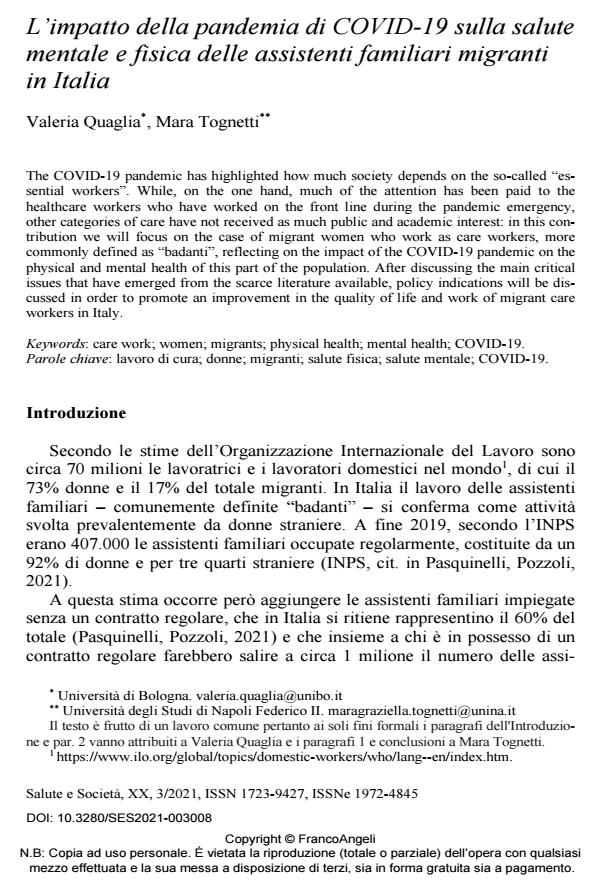L’impatto della pandemia di COVID-19 sulla salute mentale e fisica delle assistenti familiari migranti in Italia
Journal title SALUTE E SOCIETÀ
Author/s Valeria Quaglia, Mara Tognetti
Publishing Year 2021 Issue 2021/3
Language Italian Pages 17 P. 124-140 File size 277 KB
DOI 10.3280/SES2021-003008
DOI is like a bar code for intellectual property: to have more infomation
click here
Below, you can see the article first page
If you want to buy this article in PDF format, you can do it, following the instructions to buy download credits

FrancoAngeli is member of Publishers International Linking Association, Inc (PILA), a not-for-profit association which run the CrossRef service enabling links to and from online scholarly content.
The COVID-19 pandemic has highlighted how much society depends on the so-called "essen-tial workers". While, on the one hand, much of the attention has been paid to the healthcare workers who have worked on the front line during the pandemic emergency, other categories of care have not received as much public and academic interest: in this contribution we will focus on the case of migrant women who work as care workers, more commonly defined as "badanti" reflecting on the impact of the COVID-19 pandemic on the physical and mental health of this part of the population. After discussing the main critical issues that have emerged from the scarce literature available, policy indications will be discussed in order to promote an improvement in the quality of life and work of migrant care workers in Italy.
Keywords: care work; women; migrants; physical health; mental health; COVID-19
- Immigrant Women’s Protagonism: Exercising Leadership Roles in Ethnic Churches at the Time of the Pandemic in Italy Samuele Davide Molli, in Religions /2022 pp.696
DOI: 10.3390/rel13080696 - Introduzione Silvana Salerno, Valeria Quaglia, in WELFARE E ERGONOMIA 1/2022 pp.31
DOI: 10.3280/WE2022-001004 - Citizens here and there against the crisis: immigrant organizations’ transnational solidarity during the COVID-19 pandemic Maurizio Artero, in Frontiers in Sociology 1519301/2025
DOI: 10.3389/fsoc.2025.1519301
Valeria Quaglia, Mara Tognetti, L’impatto della pandemia di COVID-19 sulla salute mentale e fisica delle assistenti familiari migranti in Italia in "SALUTE E SOCIETÀ" 3/2021, pp 124-140, DOI: 10.3280/SES2021-003008